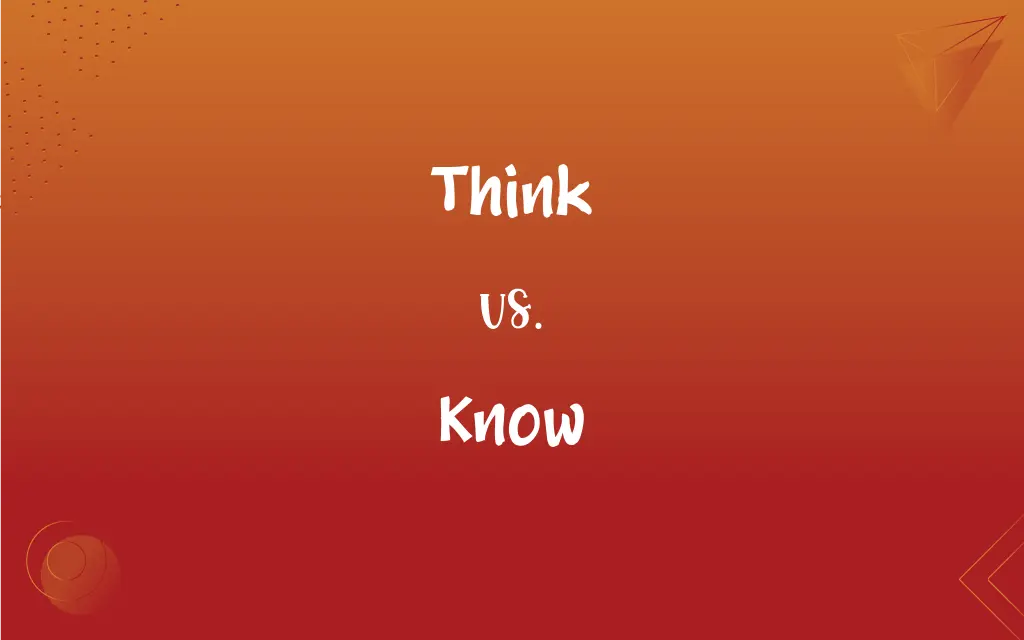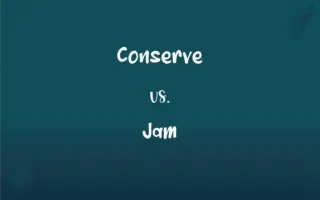Think vs. Know: What's the Difference?
Edited by Aimie Carlson || By Harlon Moss || Updated on November 6, 2023
To think is to consider or believe something; to know is to have a confirmed understanding or awareness.

Key Differences
Thinking is a cognitive process in which ideas or solutions are formed, considered, or believed without certainty. It is the act of contemplating or reasoning about something that may or may not be well-founded. Knowing, on the other hand, involves a level of certainty and conviction that comes from experience, education, or evidence. Knowledge is generally factual and verifiable, while thoughts can be speculative or based on opinion.
When someone says they think something, they are expressing a belief or opinion that they hold. It does not necessarily imply that they have evidence or are sure about it. To know something, however, is to have established information about it and to hold it as true. Knowledge typically requires some level of proof or experience, whereas thinking does not.
The process of thinking can lead to knowledge when the ideas or beliefs are confirmed through learning, research, or experience. Until then, thoughts are tentative, and they do not have the same weight as knowledge. Knowing is definitive and carries a sense of authority that thinking does not. For example, someone might think it will rain tomorrow based on the weather, but they can know the time of sunset if they look it up.
One can think about various scenarios or possibilities, and this can encompass imagination, guesswork, and hypothesizing. Knowing is more constrained by reality; one cannot know something that is false or unverified. Therefore, thinking is a precursor to knowledge but is not synonymous with it.
Thinking can change frequently as new information is presented or as one reflects further, but knowledge, particularly of established facts, is less volatile. What one knows to be true remains relatively stable over time. Both thinking and knowing are essential to the human experience, facilitating our ability to understand and interact with the world.
ADVERTISEMENT
Comparison Chart
Definition
To form opinions or beliefs
To have facts or information; to be certain of
Certainty
Subjective and can be uncertain
Objective and certain
Evidence
Does not require evidence
Often based on evidence or experience
Changeability
Thoughts can change easily
Knowledge is relatively stable
Expression
"I think we should leave early."
"I know the meeting starts at 9 AM."
ADVERTISEMENT
Grammar
Often used with conditional clauses
Used to express possession of information
Type of Process
Cognitive reasoning or contemplating
Cognitive recognition of facts or truths
Think and Know Definitions
Think
Use one's mind actively to form connected ideas.
She thinks deeply about social issues.
Know
Be aware of through observation, inquiry, or information.
I know the answer to the question.
Think
Believe or have an opinion.
I think he's the best choice for the job.
Know
Have developed a relationship with (someone) through meeting and spending time with them.
She knows her classmates well.
Think
Recall or remember (something).
Do you think what I told you last week?
Know
Be absolutely certain or sure about something.
I know that I left my keys on the table.
Think
Consider or reflect on.
I need to think before making a decision.
Know
Be familiar or acquainted with (something).
She knows the rules of the game.
Think
Intend or plan (something).
We think to visit you this summer.
Know
Have knowledge or information concerning.
He knows French and Spanish.
Think
To have or formulate in the mind
Think the happiest thought you can think.
Know
To perceive directly; grasp in the mind with clarity or certainty.
Think
To reason about or reflect on; ponder
Think how complex language is. Think the matter through.
Know
To regard as true beyond doubt
I know she won't fail.
Know
To have a practical understanding of, as through experience; be skilled in
Knows how to cook.
FAQs
Can thinking lead to knowing?
Yes, through gathering evidence and verification, thinking can transition into knowing.
Is knowing always 100% certain?
Knowledge is generally certain, but new evidence can sometimes revise what is known.
Does everyone think the same way?
No, thinking is influenced by individual perspectives and experiences.
Can one know something without thinking?
Basic knowledge can be instinctual or memorized without active thinking.
What does it mean to think critically?
To engage in reflective and independent thinking, assessing information or arguments.
How does education affect what we know?
Education provides information and frameworks that shape and expand our knowledge base.
Can we control what we think?
To some extent, we can direct our focus and choose our attitudes.
What's the difference between a thought and a fact?
A thought is an idea or opinion, while a fact is a statement that is true and verifiable.
Do thoughts influence feelings?
Yes, thoughts can significantly influence one’s emotions.
Is all knowledge derived from thinking?
Not all; some knowledge is intuitive or experiential.
What does 'think aloud' mean?
It means to say what one is thinking, often to clarify thought processes.
Is it possible to think without language?
Yes, thoughts can be visual or emotional rather than verbal.
Is there a limit to what one can know?
Human knowledge is vast, but individually, cognitive and experiential limits exist.
Does knowing require education?
Not necessarily; it can also come from personal experience.
Can knowledge be intuitive?
Yes, some knowledge is intuitive, coming from instinct rather than conscious reasoning.
How does thinking affect decision-making?
Good thinking can lead to more informed and better decisions.
How do we improve our thinking?
By engaging in varied intellectual activities and challenging our assumptions.
Can knowledge become outdated?
Yes, as new discoveries are made, what was once known can be updated or replaced.
Does everyone know the same things?
No, knowledge varies based on individual experiences and learning.
How do we know what we think is true?
Through reasoning, evidence, and sometimes confirmation by others.
About Author
Written by
Harlon MossHarlon is a seasoned quality moderator and accomplished content writer for Difference Wiki. An alumnus of the prestigious University of California, he earned his degree in Computer Science. Leveraging his academic background, Harlon brings a meticulous and informed perspective to his work, ensuring content accuracy and excellence.
Edited by
Aimie CarlsonAimie Carlson, holding a master's degree in English literature, is a fervent English language enthusiast. She lends her writing talents to Difference Wiki, a prominent website that specializes in comparisons, offering readers insightful analyses that both captivate and inform.































































